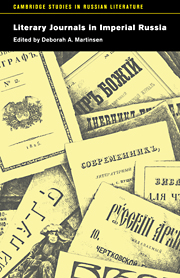Book contents
- Frontmatter
- Contents
- Notes on contributors
- Acknowledgements
- 1 Introduction
- PART I EIGHTEENTH CENTURY
- PART 2 EARLY NINETEENTH CENTURY
- 3 Periodicals in literary life of the early nineteenth century
- 4 N. A. Polevoi's Moscow Telegraph and the journal wars of 1825–1834
- PART 3 MID NINETEENTH CENTURY
- PART 4 SILVER AGE
- List of titles of journals and almanacs
- Select bibliography
- Index
- CAMBRIDGE STUDIES IN RUSSIAN LITERATURE
4 - N. A. Polevoi's Moscow Telegraph and the journal wars of 1825–1834
Published online by Cambridge University Press: 11 March 2010
- Frontmatter
- Contents
- Notes on contributors
- Acknowledgements
- 1 Introduction
- PART I EIGHTEENTH CENTURY
- PART 2 EARLY NINETEENTH CENTURY
- 3 Periodicals in literary life of the early nineteenth century
- 4 N. A. Polevoi's Moscow Telegraph and the journal wars of 1825–1834
- PART 3 MID NINETEENTH CENTURY
- PART 4 SILVER AGE
- List of titles of journals and almanacs
- Select bibliography
- Index
- CAMBRIDGE STUDIES IN RUSSIAN LITERATURE
Summary
The remarkable upsurge in polemics among Russian literary periodicals in the 1820s may be attributed in part to the upheavals of a fledgling literature striving for national identity. Scholars have tried for years to explain the decade's heated literary debates. A close study of the polemics of the 1820s and early 1830s, however, reveals that literary issues were absent from, or else peripheral to, some of the most bitter conflicts, which, in fact, resulted from intense personal rivalries and competition for readers and profit.
Polemics – aggressive disputes marked by repeated attacks and counter-attacks – were so prevalent in the 1820s and had such varied causes that only a monograph could offer a satisfactory treatment of the subject. My aim in this essay is more modest: to examine the polemics involving N. A. Polevoi's Moscow Telegraph (Moskovskii telegraf) (1825–34), the leading literary journal of its time, and to explore their meaning for the development of literary journals. The Telegraph's vigorous advocacy of Romanticism ensured its participation in many literary controversies. But the Telegraph also participated in two major “journal wars” in which literary issues were not paramount. Competition, for instance, was the principal motive behind the Telegraph's bitter conflict of 1825–27 with the periodicals of F. V. Bulgarin and N. I. Grech, Son of the Fatherland (Syn otechestva), Northern Archive (Severnyi arkhiv), and The Northern Bee (Severnaia pchela). Similarly, at the core of the Telegraph's considerably weightier dispute in 1830–31 with the so-called literary aristocracy headed by A. S. Pushkin and P. A. Viazemsky was the question of journalism's role in Russian life.
- Type
- Chapter
- Information
- Literary Journals in Imperial Russia , pp. 64 - 88Publisher: Cambridge University PressPrint publication year: 1998



